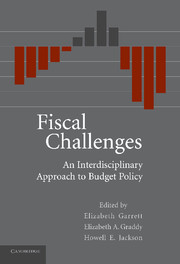Book contents
- Frontmatter
- Contents
- Preface
- Contributors
- PART ONE THE LAW AND POLITICS OF FISCAL POLICY
- PART TWO UNDERSTANDING FEDERAL DEFICITS AND PUBLIC DEBT
- PART THREE BUDGETING AND FISCAL CONSTRAINTS AT THE STATE LEVEL
- PART FOUR INTERGOVERNMENTAL ASPECTS OF BUDGET POLICY
- PART FIVE JUDICIAL POWERS AND BUDGET POLICY
- Index
PART FOUR - INTERGOVERNMENTAL ASPECTS OF BUDGET POLICY
Published online by Cambridge University Press: 23 December 2009
- Frontmatter
- Contents
- Preface
- Contributors
- PART ONE THE LAW AND POLITICS OF FISCAL POLICY
- PART TWO UNDERSTANDING FEDERAL DEFICITS AND PUBLIC DEBT
- PART THREE BUDGETING AND FISCAL CONSTRAINTS AT THE STATE LEVEL
- PART FOUR INTERGOVERNMENTAL ASPECTS OF BUDGET POLICY
- PART FIVE JUDICIAL POWERS AND BUDGET POLICY
- Index
Summary
This book is designed to enable readers to perceive and understand connections that they might have overlooked: connections among different disciplines; connections among budgetary institutions in the legislative and executive branches of federal and state governments; connections between U.S. budgetary policy and fiscal policy in other countries; connections between the perceptions of voters and policymakers and actual budget policy. In this section, we examine more closely intergovernmental connections that influence fiscal outcomes.
John Joseph Wallis and Barry Weingast's examination of state constitutional debt limitations and their effect on the choice of financing methods for infrastructure differs from previous chapters in two crucial ways. First, they provide the first sustained analysis of local governments and their role in fiscal policy as they issue bonds to build roads, schools, sports stadiums, and other public goods. Any complete assessment of local government must take account of state constitutional and statutory provisions because local governments are created by the state and their powers are dramatically affected by state decisions. Second, Wallis and Weingast provide a different sort of comparative analysis than we have seen before: their analysis is historical, comparing infrastructure financing in the United States at three different periods over a 150-year time span. Although other chapters may have provided some historical context for contemporary budget institutions, this chapter is the most sustained empirical comparison of budget institutions and their consequences across a substantial period of time.
- Type
- Chapter
- Information
- Fiscal ChallengesAn Interdisciplinary Approach to Budget Policy, pp. 329 - 330Publisher: Cambridge University PressPrint publication year: 2008



